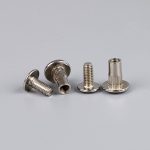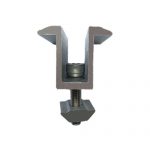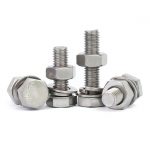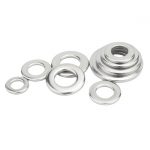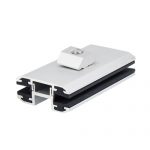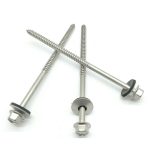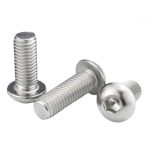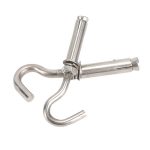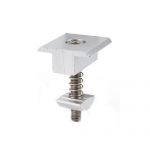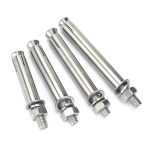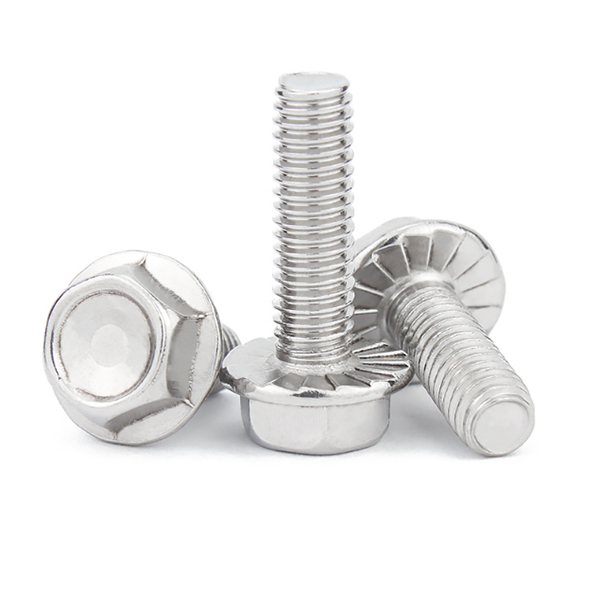
Product Description:
Standard: DIN6921 /ASME B18.2.1
GRADE: A2-70,A4-80
Material: stainless steel A2-304,A4-316,SMO254,201,202,
Size:from #12 to 2”, from M5 to M16.
Length:from 1/2" to 4" ,from12MM-100MM
Surface finish:Plain or Customized
Packing: cartons with furmigated pallets
Supply ability: 50tons per month
Assembly: normally with nut or hex flange nut
If you work in the manufacturing or construction industry, you've probably heard of flange bolts. These essential bolts are used to join two or more objects together, and are commonly found in pipelines, automotive engines, and other heavy-duty applications.
One type of flange bolt that has gained popularity in recent years is the SS flange bolt, or stainless steel flange bolt. In this article, we'll take an in-depth look at SS flange bolts, including their properties, applications, and advantages.
1. Introduction
Flange bolts are bolts that have a flange, or a wide circular base, that distributes the load over a larger surface area. This helps to prevent damage to the surface of the object being bolted and provides a more secure joint.
Stainless steel flange bolts, or SS flange bolts, are a type of flange bolt that is made from stainless steel. Stainless steel is an alloy that contains at least 10.5% chromium, which gives it its corrosion-resistant properties.
2. What is an SS Flange Bolt?
An SS flange bolt is a bolt that has a flange and is made from stainless steel. The flange is a wide circular base that provides a larger surface area for the load to be distributed over. The stainless steel used in the bolt contains at least 10.5% chromium, which provides the bolt with its corrosion-resistant properties.
3. Types of SS Flange Bolts
There are several types of SS flange bolts, including:
- Hex flange bolts: These have a hexagonal head and are the most common type of flange bolt.
- Serrated flange bolts: These have a serrated flange that bites into the surface of the object being bolted, providing extra grip.
- Button flange bolts: These have a round, smooth head that is flush with the flange, providing a more aesthetically pleasing look.
4. Properties of SS Flange Bolts
Corrosion Resistance
One of the most significant advantages of SS flange bolts is their corrosion resistance. Stainless steel contains at least 10.5% chromium, which forms a passive oxide layer on the surface of the metal. This layer protects the metal from corrosion and gives it its characteristic shine.
Strength
SS flange bolts are also known for their strength. Stainless steel is a very strong material, and the flange design of the bolt helps to distribute the load over a larger surface area, reducing the stress on the bolt and increasing its strength.
Temperature Resistance
Stainless steel is also known for its temperature resistance. SS flange bolts can withstand high temperatures without losing their strength or corroding. This makes them ideal for use in high-temperature applications.
Magnetic Properties
One important factor to consider when choosing SS flange bolts is their magnetic properties. Stainless steel can be either magnetic or non-magnetic, depending on the specific alloy used.
Austenitic stainless steels, which are the most common type used for SS flange bolts, are non-magnetic. However, some grades of stainless steel, such as ferritic and martensitic stainless steels, are magnetic. It's important to consider the magnetic properties of the stainless steel used in the bolt to ensure that it is compatible with the surrounding materials.
5. Applications of SS Flange Bolts
SS flange bolts are used in a variety of industries and applications due to their strength and corrosion resistance. Some common applications include:
Petrochemical Industry
The petrochemical industry relies heavily on SS flange bolts due to their resistance to corrosion and high temperatures. These bolts are commonly used in pipelines, valves, and pumps.
Automotive Industry
SS flange bolts are also commonly used in the automotive industry due to their strength and corrosion resistance. They are used in engines, transmissions, and other critical components.
Aerospace Industry
The aerospace industry demands the highest standards of strength and reliability. SS flange bolts are used extensively in aircraft construction and maintenance due to their excellent performance in harsh environments.
Construction Industry
The construction industry also makes use of SS flange bolts due to their strength and resistance to corrosion. They are commonly used in the construction of bridges, buildings, and other infrastructure.
6. Advantages of SS Flange Bolts
Corrosion Resistance
The most significant advantage of SS flange bolts is their resistance to corrosion. Stainless steel is a highly corrosion-resistant material, and the flange design of the bolt provides additional protection to the surface of the object being bolted.
Strength
SS flange bolts are also known for their strength. The flange design helps to distribute the load over a larger surface area, reducing stress on the bolt and increasing its strength.
Aesthetic Appeal
In addition to their functional properties, SS flange bolts also have a more aesthetically pleasing appearance than other types of bolts. The smooth, shiny surface of the stainless steel adds a touch of elegance to any application.
Cost-Effective
While SS flange bolts may be more expensive than other types of bolts, their longevity and resistance to corrosion make them a cost-effective choice in the long run. They require less maintenance and replacement than other types of bolts, which can save money over time.
7. How to Choose the Right SS Flange Bolt
When choosing an SS flange bolt, it's essential to consider several factors, including:
Bolt Size and Length
The size and length of the bolt should be chosen based on the application requirements. It's important to select a bolt that is long enough to provide adequate thread engagement but not so long that it interferes with other components.
Bolt Grade
The strength of the bolt is determined by its grade. Stainless steel bolts are available in several grades, ranging from the most common grade 304 to high-performance grades such as 316 and 410.
Flange Type
There are several flange types available for SS flange bolts, including hex, serrated, and button. The type of flange chosen should be based on the application requirements, including load capacity and grip.
8. Installation and Maintenance of SS Flange Bolts
Installation Process
The installation of SS flange bolts is similar to that of other types of bolts. It's important to use the correct torque specifications and to tighten the bolts evenly to prevent uneven stress on the flange.
Maintenance and Inspection
SS flange bolts require little maintenance, but regular inspections should be performed to ensure their continued performance. Regular inspections should include checking for signs of corrosion or damage, as well as ensuring that the bolts are still tightened to the correct torque specifications.
If any damage or corrosion is detected, the bolts should be replaced immediately to prevent any potential safety hazards.
9. Conclusion
SS flange bolts are an essential component in many industries and applications due to their strength, corrosion resistance, and aesthetic appeal. When choosing an SS flange bolt, it's important to consider factors such as bolt size and length, bolt grade, and flange type.
Proper installation and maintenance of SS flange bolts are crucial to ensure their continued performance and safety. With their cost-effectiveness and long-term durability, SS flange bolts are an excellent choice for any application that requires a reliable and long-lasting bolt solution.
10. FAQs
Q1. Are SS flange bolts stronger than regular bolts?
A1. SS flange bolts are designed to distribute the load over a larger surface area, which can increase their strength compared to regular bolts. Additionally, stainless steel is a strong material that provides excellent strength and durability.
Q2. Can SS flange bolts be used in high-temperature applications?
A2. Yes, SS flange bolts are commonly used in high-temperature applications due to their resistance to corrosion and heat.
Q3. What is the difference between hex flange bolts and serrated flange bolts?
A3. Hex flange bolts have a hexagonal head, while serrated flange bolts have teeth on the flange to provide additional grip. The choice between the two depends on the specific application requirements.
Q4. How often should SS flange bolts be inspected?
A4. SS flange bolts should be inspected regularly, at least once a year, to ensure their continued performance and safety.
Q5. Can SS flange bolts be reused?
A5. It's generally not recommended to reuse SS flange bolts due to the risk of fatigue or damage to the bolt. It's best to replace the bolts with new ones to ensure their continued performance and safety.

